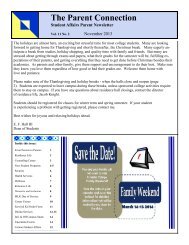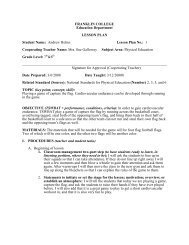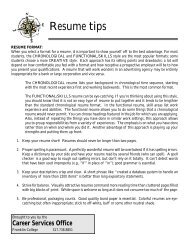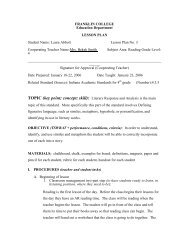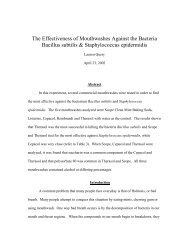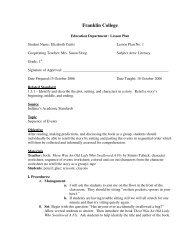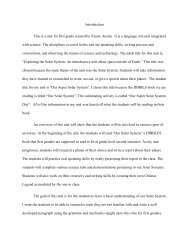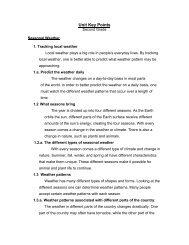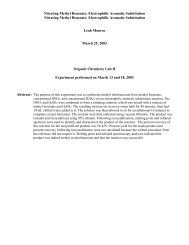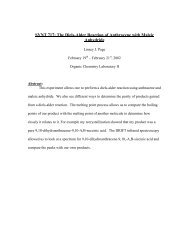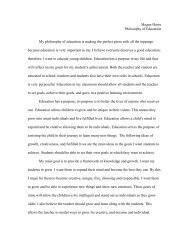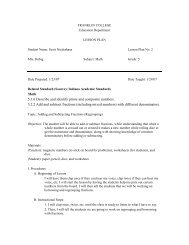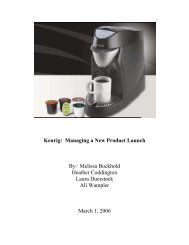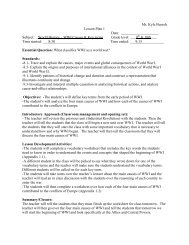09 autumn reporter 1-20 - Franklin College
09 autumn reporter 1-20 - Franklin College
09 autumn reporter 1-20 - Franklin College
Create successful ePaper yourself
Turn your PDF publications into a flip-book with our unique Google optimized e-Paper software.
Marketing<br />
exec strikes<br />
gold with<br />
“corny” idea<br />
By Amy (Kean) VerSteeg ’96<br />
Editor<br />
It didn’t take long for Arch West ’36<br />
to start chipping in merchandising ideas<br />
after he went to work for the Frito Co.<br />
(later Frito-Lay) in 1960. One of his<br />
product innovations fused the texture of<br />
a potato chip with the flavor of a corn<br />
chip and featured a distinct shape; the<br />
triangular tortilla chips better known<br />
today as Doritos ® hit the market in 1962.<br />
As West tells it, the product name<br />
preceded the invention of the snack.<br />
“When the head of the legal department<br />
and I made a trip to Mexico City to register<br />
the Frito name for international sales,<br />
we began looking into how to associate<br />
the Spanish language with the products.<br />
We’d also been mulling over ideas for a<br />
chip that wasn’t quite yellow or brown,<br />
but somewhere in between. The Spanish<br />
word ‘oro,’ meaning gold, seemed<br />
to fit,” said West.<br />
Spanish helped form the full name<br />
Doritos, ® and with that the “little bits<br />
of gold” were on their way to being<br />
invented and test-marketed.<br />
The first Doritos ® were made in a<br />
laboratory, where baking experiments<br />
were conducted with three types of corn.<br />
Once West and the team found the right<br />
combination of ingredients, a small,<br />
privately-owned company in California<br />
was selected to produce the snacks for<br />
test-marketing in San Diego.<br />
“The Nielsen Report indicated not<br />
only strong sales but repeat purchases,”<br />
said West. “We had to move fast after<br />
that because word was getting out to<br />
our competitors.”<br />
A lot about Doritos ® has changed<br />
since the Frito Co. introduced the original<br />
product 47 years ago. According to the<br />
company Web site, there currently are<br />
13 flavors, with mini-sized chips and<br />
reduced-fat varieties also available.<br />
West’s two favorite flavors, by the way,<br />
are the Classic Nacho Cheese and Ranch.<br />
One thing that hasn’t changed about<br />
the chip is its unique shape, which<br />
was chosen as the “sensible” solution,<br />
said West.<br />
“We found that cutting sheets of dough<br />
into triangles yielded more products than<br />
could be achieved with circles. In other<br />
words, triangles reduced the amount of<br />
leftovers. We also thought triangles were<br />
the best shape for dips.”<br />
If supply is a reflection of demand,<br />
then consumers must agree that Doritos ®<br />
are ideal. It’s practically impossible to walk<br />
down the snack aisle of any retail location<br />
without seeing a display. For West, it’s a<br />
sight that never gets stale.<br />
“When I go into a supermarket, I still get<br />
a kick out of seeing Doritos. ® I think, ‘That<br />
was my idea, and it’s still going.’” he said.<br />
West’s success at the Frito Co. followed<br />
several other executive positions, which<br />
perhaps wouldn’t have been possible<br />
without his first job after college.<br />
“My mother’s brother was vice president<br />
of a dairy company with a facility in<br />
Wisconsin, and he invited me to take a<br />
position there and start expanding on<br />
my abilities,” said West. “I worked in<br />
warehousing and transportation and<br />
then in cheese quality control.”<br />
West, who’d earned his bachelor’s<br />
degree in business management, found<br />
the behind-the-scenes work satisfying.<br />
“I’d never had much interest in going<br />
and punching typewriter keys,” said West.<br />
“I was more excited about marketing and<br />
the ideas and creativity involved in making<br />
a product to sell.”<br />
Just as West was starting to find a career<br />
niche in the food industry, civic duty<br />
called, and he enlisted in service with the<br />
U.S. Navy. After an honorable discharge,<br />
he returned to the food industry and<br />
landed a position with Standard Brands,<br />
the parent company of Tender Leaf ® tea,<br />
Royal ® gelatin and Blue Bonnet ®<br />
margarine, among others.<br />
Many times West was transferred to a<br />
new city to take on fresh assignments for<br />
Standard Brands; he spent time living and<br />
working in Philadelphia, Chicago and<br />
Kansas City.<br />
“I never got bored. The company<br />
kept me moving around to different<br />
departments. I had the chance to work<br />
in finance, sales, raw materials and<br />
acquisitions.”<br />
58 FRANKLIN REPORTER WWW.FRANKLINCOLLEGE.EDU



